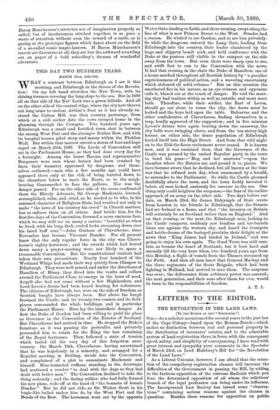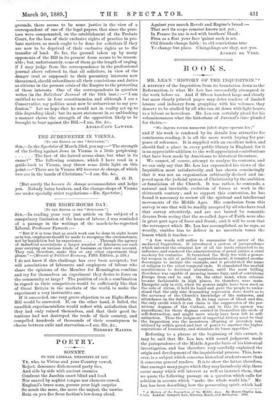LETTERS TO THE EDITOR.
'111.h1 REVOLUTION IN THE LAND LAWS. [To THE EDITOR OF THE " SPECTATOR."] Sia,—As a solicitor accustomed for several years to the just law of the Cape Colony—based upon the Roman-Dutch—which makes no distinction between real and personal property in the distribution of intestates' estates, and to the admirable system of land-registration there in force, with the consequent speed, safety, and simplicity of conveyancing, I have read with great interest and sympathy your comments in the Spectator- of March 23rd, on Lord Halsbury's Bill for " the Revolution of the Land Laws."
As a Liberal Unionist, however, I am afraid that the reten- tion of the compulsory registration clauses will increase the difficulties of the Government in passing the Bill, by adding to the factious opposition of the extreme Radicals which you fear, the determined opposition of all whom the solicitors' branch of the legal profession can bring under its influence.. The Incorporated Law Society has issued some " observa- tions" containing serious reasons against the clauses in question. Besides these reasons for opposition on public grounds, there seems to be some justice in the view of a .correspondent of one of the legal papers, that since the proc- tors were compensated, on the establishment of the Probate Court, for the loss of their exclusive rights of practice in pro- bate matters, as much ought to be done for solicitors if they are now to be deprived of their exclusive rights as to the transfer of land. So far, the ground taken up by many -opponents of the Bill in its present form seems to be reason- able ; but, unfortunately, some of them go the length of urging, if I may judge from the correspondence in the professional journal above referred to, that all solicitors, in view of the ,danger (real or supposed) to their pecuniary interests now threatened, should subordinate all their convictions and duties as citizens in the present crisis of the Empire to the protecting of those interests. One of the correspondents in question writes (in the Solicitors' Journal of the 16th inst.) :—" I am entitled to vote in four constituencies, and although I am a -Conservative, my politics must now be subservient to my pro- fession." Let us hope that he would not in reality act up to this degrading ideal ; but its mere statement in so unblushing a manner shows the strength of the opposition likely to be brought to bear against the Bill.—I am, Sir, &e.,
ANGLO-CAPE LAWYER.



















































 Previous page
Previous page